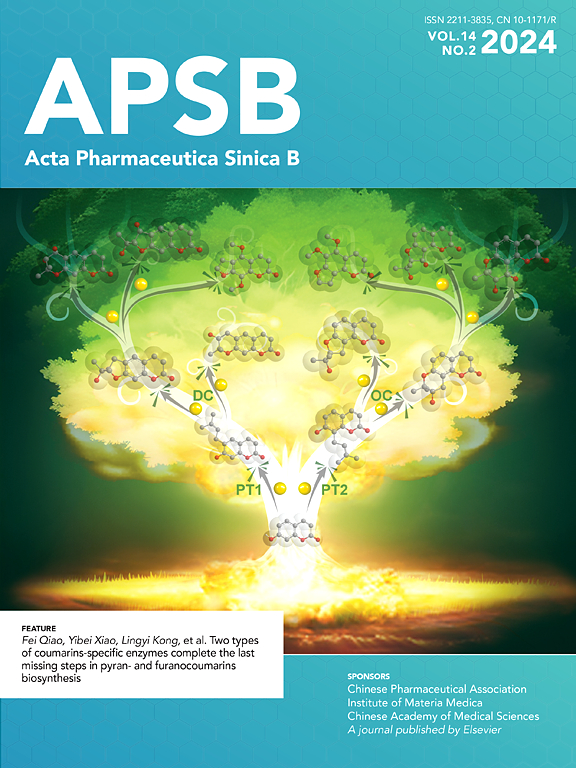Overview of host-directed antiviral targets for future research and drug development
IF 14.7
1区 医学
Q1 PHARMACOLOGY & PHARMACY
引用次数: 0
Abstract
Viruses constitute a significant group of pathogens that have caused numerous fatalities and substantial economic losses in recent years, particularly with the emergence of coronaviruses. While the impact of SARS-CoV-2 appears to be diminishing in daily life, only a limited number of drugs have received approval or emergency use authorization for its treatment. Given the high mutation rate of viral genomes, host-directed agents (HDAs) have emerged as a preferred choice due to their broad applicability and lasting effectiveness. In contrast to direct-acting antivirals (DAAs), HDAs offer several advantages, including broad-spectrum antiviral activities, potential efficacy against future emerging viruses, and a lower likelihood of inducing drug resistance. In our review article, we have synthesized known host-directed antiviral targets that span diverse cellular pathways and mechanisms, shedding light on the intricate interplay between host cells and viruses. Additionally, we have provided a brief overview of the development of HDAs based on these targets. We aim for this comprehensive analysis to offer valuable perspectives and insights that can guide future antiviral research and drug development efforts.

展望宿主抗病毒靶点的未来研究和药物开发
病毒是一类重要的病原体,近年来,特别是随着冠状病毒的出现,造成了大量死亡和重大经济损失。虽然SARS-CoV-2对日常生活的影响似乎正在减弱,但只有有限数量的药物获得了批准或紧急使用授权。鉴于病毒基因组的高突变率,宿主定向药物(HDAs)因其广泛的适用性和持久的有效性而成为首选。与直接作用抗病毒药物(DAAs)相比,hda具有多种优势,包括广谱抗病毒活性,对未来新出现的病毒有潜在疗效,以及诱导耐药的可能性较低。在我们的综述文章中,我们合成了已知的宿主定向抗病毒靶点,这些靶点跨越了不同的细胞途径和机制,揭示了宿主细胞与病毒之间复杂的相互作用。此外,我们还简要概述了基于这些目标的hda的开发。我们的目标是提供有价值的观点和见解,可以指导未来的抗病毒研究和药物开发工作。
本文章由计算机程序翻译,如有差异,请以英文原文为准。
求助全文
约1分钟内获得全文
求助全文
来源期刊

Acta Pharmaceutica Sinica. B
Pharmacology, Toxicology and Pharmaceutics-General Pharmacology, Toxicology and Pharmaceutics
CiteScore
22.40
自引率
5.50%
发文量
1051
审稿时长
19 weeks
期刊介绍:
The Journal of the Institute of Materia Medica, Chinese Academy of Medical Sciences, and the Chinese Pharmaceutical Association oversees the peer review process for Acta Pharmaceutica Sinica. B (APSB).
Published monthly in English, APSB is dedicated to disseminating significant original research articles, rapid communications, and high-quality reviews that highlight recent advances across various pharmaceutical sciences domains. These encompass pharmacology, pharmaceutics, medicinal chemistry, natural products, pharmacognosy, pharmaceutical analysis, and pharmacokinetics.
A part of the Acta Pharmaceutica Sinica series, established in 1953 and indexed in prominent databases like Chemical Abstracts, Index Medicus, SciFinder Scholar, Biological Abstracts, International Pharmaceutical Abstracts, Cambridge Scientific Abstracts, and Current Bibliography on Science and Technology, APSB is sponsored by the Institute of Materia Medica, Chinese Academy of Medical Sciences, and the Chinese Pharmaceutical Association. Its production and hosting are facilitated by Elsevier B.V. This collaborative effort ensures APSB's commitment to delivering valuable contributions to the pharmaceutical sciences community.
 求助内容:
求助内容: 应助结果提醒方式:
应助结果提醒方式:


